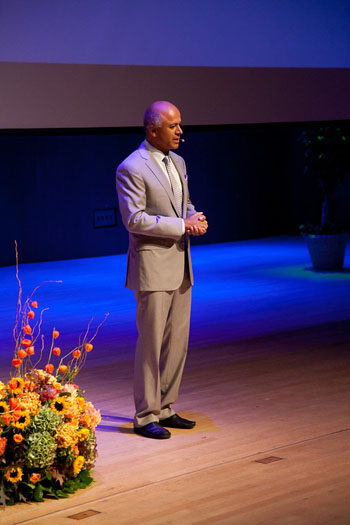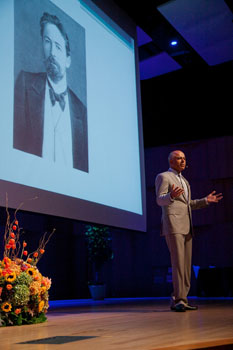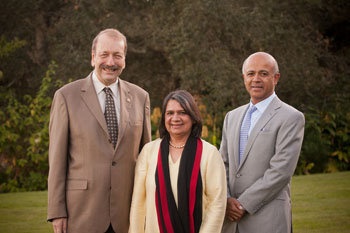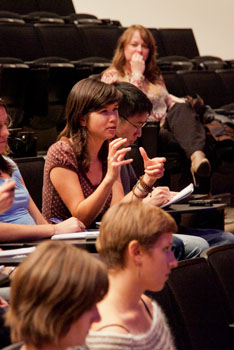Campus News
Best-selling author, doctor Abraham Verghese wows capacity crowd
Physician and bestselling author Abraham Verghese worries that an overemphasis on medical technology is distancing doctors from patients. Dr. Verghese voiced his concerns during the 11th annual Sidhartha Maitra Memorial Lecture on campus.




Without empathy, doctors and novelists would be lost.
Both professions require craft, discipline, and vision, but those qualities are not enough. Physicians and writers must have sympathetic imaginations. They must project themselves into the hearts and minds of others.
That’s why Dr. Abraham Verghese —a physician and the author of best-selling novel Cutting for Stone—places such a premium on listening to patients, making bedside visits, and performing thorough examinations.
But Verghese, who delivered the 11th annual Sidhartha Maitra Memorial Lecture to a capacity crowd at UCSC’s Music Center Recital Hall, worries that a constant emphasis on medical technology and computerized diagnostics is distancing doctors from patients, making sick people worry that they are being treated as diseases, data, or “iPatients,” the human equivalent of iPhones and iPods.
“The iPatient is getting wonderful care across America, while the real patient is wondering, ‘where the hell is everyone, who is in charge, and who is caring for me?” said Verghese, professor for the Theory and Practice of Medicine at the Stanford University School of Medicine and senior associate chair of the Department of Internal Medicine.
Cutting for Stone, Verghese’s first novel, is now in its 87th week on the New York Times bestseller list.
To further illustrate his point, Verghese imagined an alien from outer space visiting a modern-day medical center and wondering if the doctors believe their patients’ bedsides are “toxic,” or if the purpose of admission into a hospital “is to render a 3D human into a 2D image.”
Later, Verghese joked that if you were to enter a hospital missing a limb, “no one would believe you unless you got a CAT scan diagnosis.”
What’s missing, he says, is the old-fashioned, intimate ritual of the bedside visit.
Verghese argues that this kind of medical practice is not only soul-fulfilling for patients and doctors alike; he also believes it’s more effective. By rekindling the excitement of medical care, and the personal connection to patients, doctors will be more attentive, committed, and thorough in their work, he believes.
Besides, he added, when doctors perform these rituals, they actually save time and money by eliminating the need for unnecessary tests.
“I’m not a Luddite,” he explained. “I love technology, but the doctor’s presence, his tone of voice, his concern—all these things have an effect.”
Breaking down barriers
Verghese’s resume is impressive. He holds an MD from Madras Medical College in India and an MFA from the prestigious University of Iowa Writers’ Workshop. This self-described perpetual outsider was born to Indian parents in Ethiopia, where his medical training began. He served as a resident at a hospital in Johnson City, Tennessee, where he returned after completing a fellowship at the Boston University School of Medicine.
After developing his patient-care philosophy, he found a platform for these beliefs when he became the founding director of the Center for Medical Humanities & Ethics at the University of Texas Health Science Center San Antonio, prior to taking his position at Stanford.
Along the way, his publishing credits brought him even more attention than his medical achievements. In Tennessee, his experience caring for AIDS patients changed his life and inspired the nonfiction book My Own Country: A Doctor’s Story. Another nonfiction book, The Tennis Partner, tells the story of a friend and colleague struggling with drug and sex addiction.
Verghese attributes much of his success in both realms to his emphasis on intimacy, human stories, and telling details.
Journey toward Cutting for Stone
Ritual and empathy can be found at the heart of Cutting for Stone, which charts the journey of two brothers who are destined to be surgeons.
Early in the novel, one of his characters speaks out about the emotional risk that the best doctors must face day by day, along with the healing—and sometimes devastating—effects of that risk: “Few doctors will admit this, certainly not young ones, but subconsciously, in entering the profession, we must believe that ministering to others will heal our woundedness. And it can. But it can also deepen the wound.”
It’s easy to imagine that Verghese was speaking through his character. His own medical journey has led him to a similar combination of fulfillment and heartache. Indeed, he has called his own career “a passionate quest, a romantic pursuit,” and “a privileged yet hazardous undertaking.”
Along the way, Verghese has used writing as an act of discovery and exploration that feeds into his medical philosophies.
Although he’s enjoying great success as a writer, he still thinks of himself as “all doctor.” In an informal dialogue before the lecture with fiction writer and UCSC literature professor Karen Tei Yamashita and Science Communication Program director Robert Irion, Verghese insisted that his medical work was “not a day job. It’s a great privilege.”
Addressing a small group of Science Communication students, Verghese likened his writing to a “research program” that reinforces his medical philosophies. “It’s not like I didn’t want good things to happen to my novel, but it could take its sweet time. I’ve got a good job, something I love.”
The Sidhartha Maitra Memorial Lecture was an appropriate venue for Verghese and his message. The lecture series was established by Anuradha Luther Maitra in memory of her husband, Sid, a scientist, entrepreneur, and admirer of the work of late Indian film director Satyajit Ray. The lecture is sponsored by the UC Santa Cruz Foundation, and is one of the cornerstone events of UCSC’s annual Founders Celebration.